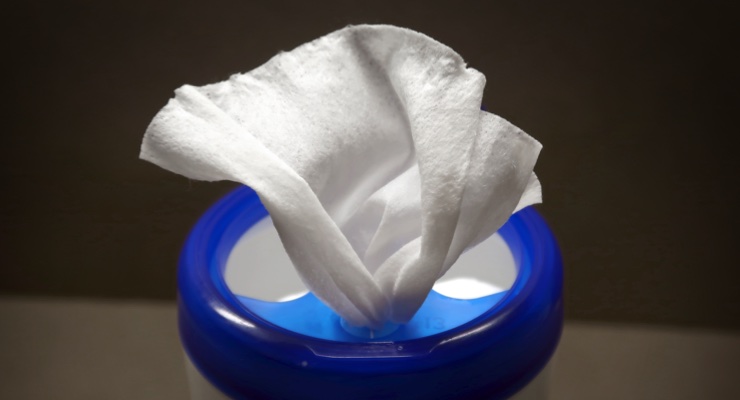07.13.22
The U.S. market for wipes totaled $3.8 billion in sales of 147 billion units in 2021, according to a Freedonia Group industry study.
Sustainability is of increasing importance in the U.S. wipes market, the market researcher reports. Suppliers of baby, personal hygiene, and household wipe products continue developing items that appeal to consumer desires for sustainability and environmental safety. Consumers increasingly want their products to have ingredient transparency, be biodegradable, and be derived from natural sources. These trends – coupled with regulatory actions to influence the development of products that have improved flushability or less plastic content – will encourage greater use of these products going forward.
In 2020, major players in the wipes and nonwovens market – such as Nice-Pak, Rockline, Kimberly-Clark, Procter & Gamble, and Essity – formed the Responsible Flushing Alliance to address flushability and dispersability issues with wipes that are not designed to be flushable entering wastewater streams. The first goal of the Alliance is to educate end users on wipes disposal and to promote "Do Not Flush" labels on products that are not suitable for sewer lines. Additionally, both INDA and individual wipes suppliers continue to try to educate consumers about the issue.
Looking forward, demand for many wipes products will benefit greatly from the development of products that can be demonstrated to be flushable and dispersible by the standards of all interested parties.
Freedonia's Wipes report provides historical data for 2011, 2016, and 2021 and forecasts for 2026 and 2030 for wipe demand in units and current dollars (which are not adjusted to account for inflation) by product (wet wipes and dry wipes), market, and application.
Sustainability is of increasing importance in the U.S. wipes market, the market researcher reports. Suppliers of baby, personal hygiene, and household wipe products continue developing items that appeal to consumer desires for sustainability and environmental safety. Consumers increasingly want their products to have ingredient transparency, be biodegradable, and be derived from natural sources. These trends – coupled with regulatory actions to influence the development of products that have improved flushability or less plastic content – will encourage greater use of these products going forward.
In 2020, major players in the wipes and nonwovens market – such as Nice-Pak, Rockline, Kimberly-Clark, Procter & Gamble, and Essity – formed the Responsible Flushing Alliance to address flushability and dispersability issues with wipes that are not designed to be flushable entering wastewater streams. The first goal of the Alliance is to educate end users on wipes disposal and to promote "Do Not Flush" labels on products that are not suitable for sewer lines. Additionally, both INDA and individual wipes suppliers continue to try to educate consumers about the issue.
Looking forward, demand for many wipes products will benefit greatly from the development of products that can be demonstrated to be flushable and dispersible by the standards of all interested parties.
Freedonia's Wipes report provides historical data for 2011, 2016, and 2021 and forecasts for 2026 and 2030 for wipe demand in units and current dollars (which are not adjusted to account for inflation) by product (wet wipes and dry wipes), market, and application.


